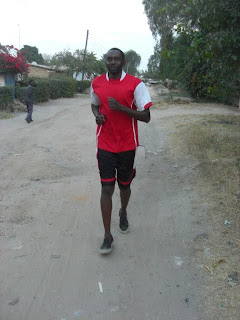We arrive at a village on morning with a bagful of veg and a sack of ugali flour. The landscape is as quiet as can be in the run up to elections. The village today is Chinangali 2. It’s closer to the main road than other villages and there are more cement houses propping up from the pale, dusty-dry landscape than tembes (traditional village homes). Villagers who work in the fields are not around. Those left behind are mainly children, aimlessly hanging about, and women who are busy drying their crops on the roof or grinding their mboga. The only men in sight are over the age of 50, and sadly, drunk. Or on their way there.

We are looking for the stove monitor. After a half hour wait we suspect she must have gone campaigning. CCM are giving out free yellow and green kangas and other merchandize to those who help campaign for them. Levina and I are leaning on the car’s door. We’re feeling a bit slow and tired after some last minute vehicle set-backs and a long drive in hot, dry climate.
- “Did she know we were coming?”I ask, starting to regret not checking myself if we’d made these arrangements before setting out.
- “I don’t know”
- “Oh no..., can you call her now to make sure? We can wait by the chairman’s office”
- “But I don’t have her number” says Levina lethargically.
- “Do you have another builder’s number?”
- “No...” Pause. “Wait...”
Levina goes off to a nearby banda, then comes back. “Yes she’s gone campaigning to Chamwino, and she doesn’t have a mobile phone”.
Right. We’ve hired a car for three times the price we’d normally pay for fuel plus have got all the ingredients for today’s stove demo! There’s no way our treasurer will understand if we cancel this one and we don’t have any upcoming free days to reschedule it. But luck is looking out for us. Joyci, the monitor, turns up out of nowhere. We catch sight of her and run towards her to ask her if she’s managed to gather the villagers wanting to learn about the stove benefits. We normally require at least 10 to be present at each stove demo to make it worth the effort. But Joyci has no one. “It’s election time soon”, she mumbles. The familiar excuse for any lack of progress, everywhere around Dodoma for the past 3 months. Villages come to a standstill as any form of gathering is prohibited for fear it becomes political. But the universities too are affected. They have been closed for 2 months longer than usual “to allow students to vote in their home towns”. Though it is widely believed it is a CCM tactic to dilute the student vote, largely in favour of CCMs opposition party, and to repress any form of manifestation. Incubating healthy opposition surely cannot be in CCM’s long term interest...
We convince Joyci to stick around for a few more hours and help us gather people for the stove demo, though this is a long shot considering there’s not many free people around. The chairman is welcoming and offers us his own home for carrying out the demo. I scratch my brain thinking of a way to gather a few viewers. Oh no. Door to door sales... It’s the only way gather people fast. Justin and Levina have already claimed the two stools outside the home and Levina is busy talking to the neighbour who will potentially stick around to watch the demo. I find myself searching for people who may be looking at us. We stand out as outsiders in our yellow T-shirts and despite my efforts to improve in Kiswahili, my physical appearance is still a give away ;) But there’s no one around. Where are the starers when you need them? I catch a glimpse of two women approaching far away with heavy water buckets on their heads. Perhaps they’re too tired and busy. I greet the men festering in the sogam-based local brew in an attempt to ignite the village elders’ interest and snowball the curiosity from there. Bad idea. They turn loud and get excited about there being external attention. But their tone is disrespectful and I quickly get out of their smelly circle.
And so my career in door to door marketing begins in a village near Dodoma. I wave and call out in broken grammar and limited vocabulary, skimming the horizon for any onlooker. “STT is carrying out a wonderful demonstration of how the rocket stove works”, “Those who come can enjoy the meal that you can see being cooked!”, I grin. “Have you heard of the rocket stove?”, “Don’t you know that the 3 stone fire will get you nowhere?”, in true Jehovah’s Witness style. “Rocket stoves are splendid for your health, for saving firewood....think of the wonders you could be doing instead of fetching wood or cooking for hours!”, a pushy development line. And then my last resort: “Free food!!!”.



















